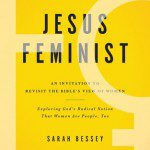“Jesus Feminist: Exploring God’s Radical Notion that Women are People, Too.”
My initial reaction to that title was “Well yeah… Like we been sayin.” Because in most mainline protestant circles, we have been HELLA sayin. For like, 100 years. Don’t get me wrong, I was glad to see this book—an apologetic for empowering women leaders in the church—emerge in the evangelical circle, because, you know, ‘those people’ sure need to read it. But I didn’t really expect to find anything in it that would speak to me or ‘my people.’
Spoiler alert: I was wrong.
This book is full of good news. For women and for men; for mainliners, progressives, evangelicals, and all who defy classification; and for all who wonder how much of the church’s identity is shaped by culture more than by Jesus.
The self-proclaimed progressives should read this book, if for no other reason than to rejoice in the fact that we have another sister on this mission against patriarchy. An especially eloquent and empassioned one at that—and one who will reach a far broader audience than we’ve managed to thus far.
Speaking of apologetics—Sarah Bessey’s are spot on. She visits the biblical ‘clobber texts’ used to keep women in narrowly focused roles, and she clobbers them right back; with a powerful mix of theology, scholarship, common sense and grace. For those of us who long ago gave up defending women’s ‘place’ in the church, because we thought our particular tradition had moved on, Bessey’s book is like reading the class notes of your smarter, harder working friend… She explores, in depth, some of the questions we’ve long dismissed as ‘not our issue anymore.’
Also? On a side note, I went to my denomination’s Senior Minister conference a couple weeks ago (a gathering for the pastors of our largest congregations) and—spoiler alert—I was the only girl there this year. So yeah, maybe our super enlightened and progressive churches have not exactly moved on…
But this book, on the whole, is not an apologetic. It is a memoir; a gospel of Jesus; a prayer; and ultimately, an invitation and a commissioning. The author challenges all Christians—not just women, and certainly not just those called to official leadership roles—to fully live into the call of discipleship. She holds up powerful stories of women throughout history, up until now, who are doing the powerful, transformative work of Jesus in their communities and world– with or without titles, acknowledgment, or permission. Really, isn’t this how all the important things get done?
There is a gentleness about Sarah that I rail against, am challenged by, and am drawn to. All at the same time! That’s how I know it’s a great book. I rail against it because when she invites women to stop fighting for ‘a place at the table’ and just follow Jesus and love people, I want to be like, ‘no, sister, you’ve got to get pissed! You’ve got to keep banging on that drum!’ And she does acknowledge that perhaps some women are called to keep up that fight. And maybe that’s me. But she’s right…it does get exhausting.
So maybe that’s also why I’m drawn to and challenged by Sarah Bessey’s work… There’s something appealing about her gracious tone and alternate road to empowerment. Something more effective, more kingdom-shaping, and more subversive than all the drum beating in the world.
Kind of sounds like someone else I know.
There were a few parts of the book that I wanted to push back against, but ultimately, I found it to be life-giving, affirming, and hopeful. I will challenge her on one point, though. She says at multiple times that she, herself, does not feel called to preach.
Really? Please, girl. This whole book is a sermon. And for the gift of it, we say thanks.
Here are some of my favorite parts, and those most telling of the work as a whole:
Let’s be done lobbying for a seat at the Table…I want to be outside with the misfits, with the rebels, the dreamers, second-chance givers, the radical grace lavishers…the ones rejected by the Table as not worthy enough or right enough.
Patriarchy is not God’s dream for humanity.
In a time when women were almost silent or invisible in literature, Scripture affirms and celebrates women. Women were a part of Jesus’ teaching, part of his life. Women were there for all of it.
Culture mores were passing as biblical mandates.
When the well-meaning glibly parrot Bible verses, stomping through the thin places between the Spirit and my humanity with all the subtlety of a clumsy four-year-old boy, something in me needs a long, deep, cleansing breath.
Life in Christ is not meant to mirror life in a Grecco-Roman culture.
I’m not sure when the Church decided that “biblical” was the perfect adjective for subjective roles and situations. I don’t think it’s helped us. Usually when people use that phrase, they are thinking more about June Cleaver than the early church’s Lydia…a sanitized sitcom society that never actually existed instead of Deborah…
[also on biblical womanhood] If the title can’t be enjoyed by a woman in Haiti, or even by the women hailed in scripture, the same way it can by a middle class woman in Canada, then biblical womanhood must be more than this.
True justice and equality don’t flow from celebrity of position or platform. Justice flows from the heart of our Abba, and when our hearts are tuned in to his heart, that justice flows through our own right-now lives.
We do not grow weary in well doing.












